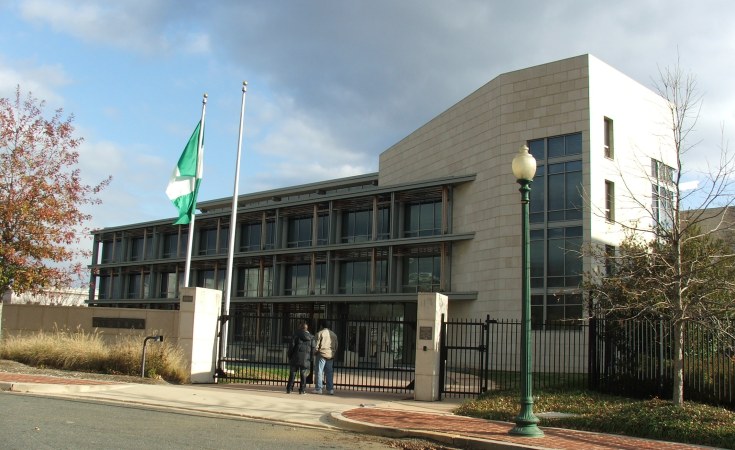Washington, DC — The absence of a Nigerian ambassador in Washington, D.C., is an urgent matter, considering Nigeria's role as an important partner for American interests on the African continent. The individual appointed to this position will face several pertinent and immediate tasks, primarily centered around improving Nigeria's standing in the United States.
This piece serves as a call to fill the void with effective representation and to prepare the incoming ambassador for strategic interventions necessary to continue building America's relationship with the emerging cultural superpower.
The Nigerian American community is recognized as the largest black immigrant community in the United States. Nigeria plays a crucial role as an important partner for American interests in Africa. The lack of representation for a country like Nigeria in Washington has far-reaching implications.
As expectations for this vacancy rise, so do the challenges. The primary challenges the new Nigerian ambassador will face can be broadly categorized into two main areas: elevating the country's standing in Washington and regaining the confidence of the Nigerian diaspora community. Melvin Foote, a U.S.-Africa Policy Strategist and President of Constituency for Africa, emphasizes that "Nigeria, with some of the most intelligent people globally, has gained notoriety for sending representatives to Washington who may not effectively represent the country's best."
This article delves into the expectations for the incoming ambassador to Washington and outlines key strategies aimed at fortifying Nigeria's standing in America.
1. Present a Clear Strategy for U.S.-Nigeria Relations
A crucial task for the incoming ambassador is to articulate a clear strategy for US-Nigeria relations. Historically, Nigeria has often found itself on the receiving end of global strategy, rather than being an architect or contributor. In contrast, the U.S. has a publicly available document called the U.S. Africa Strategy Toward the Sub-Saharan Africa, which serves as the blueprint for the United States's engagement with the African continent. The new ambassador has an opportunity to lead more powerfully and share a Nigerian strategy with the world. This anticipated strategy should encompass economic, political, and cultural dimensions, outlining Nigeria's priorities and aspirations on the international stage. This strategic approach ensures that Nigeria's interests are effectively communicated and aligned with the broader goals of the United States.
2. Engage Advocacy Groups on Foreign Policy
As it stands, there are only two congressional legislations on Nigeria on the Hill championed by Nigerian American advocacy groups:
• TPS for Nigeria, led by the Nigerian Center in Washington D.C., focuses on immigration protections for undocumented Nigerians, and
• H. Res. 82, led by the International Committee on Nigeria (ICON), which aims to designate Nigeria as a Country of Particular Concern.
To elevate Nigeria as a foreign policy priority for the U.S. the ambassador should proactively engage these diaspora groups on these policy advocacy matters. Additional key organizations the ambassador should consider engaging with include the Nigerian American Public Affairs Committee (NAPAC), Congressional Black Caucus, and Constituency for Africa. The ambassador must also work very closely the Congressional Nigerian Caucus, previously co-chaired by Congresswoman Sheila Jackson-Lee, with an aim to make the interests of the caucus bipartisan on Capitol Hill.
3. Embrace and Elevate Cultural Diplomacy
The new ambassador has an opportunity to tell a new Nigerian story to Washington. On May 29, Nigeria welcomed a new president, Bola Tinubu, who made a profound statement during his inauguration. He declared, "Nigeria is the best hope for the black race," and this offers a new language to transform the Nigerian narrative in America." This language should inform the ambassador's engagement with Washington. Telling this new story also presents an opportunity to deepen Nigeria's ties with Black America. The Nigerian perspective, with this approach, often positioned negatively, becomes irrelevant.
4. Overhaul and Improve Consular Services
Recognizing the need for change, the Nigerian Center embarked on a citizen diplomacy action. In the previous month, the center spearheaded a coalition of 20 Nigerian American organizations to petition the Tinubu administration, urging improvements in consular services. Streamlining passport applications, facilitating National Identity Number (NIN) applications, and enhancing biometric services are critical steps to ease the bureaucratic processes faced by Nigerian Americans. Efficient consular services not only directly benefit the community but also contribute to a positive image of Nigeria.
5. Build Community Partnerships with the Nigerian Diaspora
The ambassador must actively build partnerships with the Nigerian diaspora community. Similarly to the U.S. President's Advisory Council on African Diaspora Engagement. Recognizing the Nigerian diaspora's potential as a valuable resource, the ambassador should establish an advisory council comprised of Nigerian American thought, business, civic and community leaders to provide policy recommendations. This council will support the ambassador's efforts in fostering foreign direct investments, educational partnerships, and promoting cultural exchange opportunities. By tapping into the expertise within the community, the ambassador can amplify Nigeria's influence and position in Washington.
In conclusion, the expectations for the incoming ambassador to Washington are multifaceted and demand a new approach. A clear diplomatic strategy, emphasis on cultural diplomacy, consular service improvements, and building partnerships with the diaspora community are necessary components. By addressing these aspects, the ambassador can play a pivotal role in fortifying Nigeria's position in America and foster a more powerful engagement between Washington and Abuja.
Gbenga Ogunjimi is the the Founder and Executive Director of the Nigerian Center in Washington DC, the first immigrant and cultural center for the Nigerian diaspora in the United States. He is also a Fellow of the Global Leaders - African Descent Social Entrepreneurship Program of the U.S. State Department and adjunct professor at the University of the District of Columbia.


